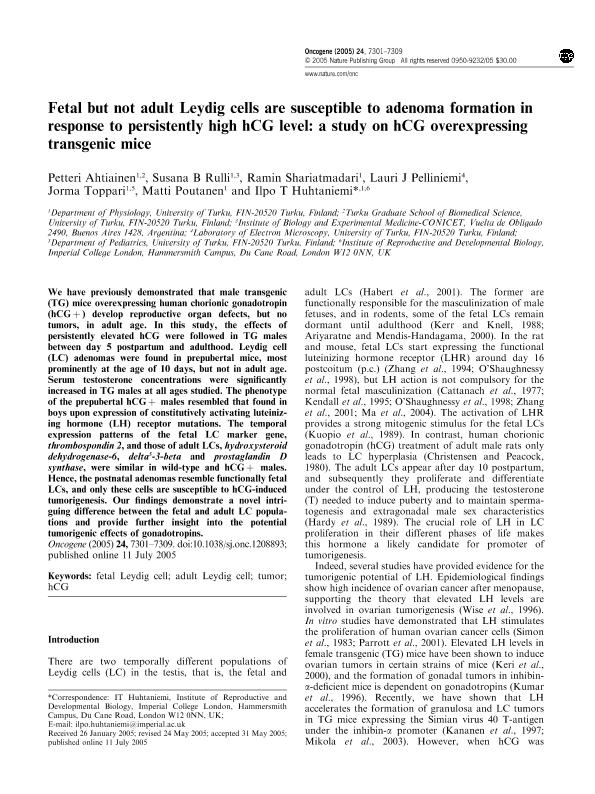Artículo
Fetal but not adult Leydig cells are susceptible to adenoma formation in response to persistently high hCG level; a study on hCG overexpressing transgenic mice
Ahtianen, Petteri; Rulli, Susana Beatriz ; Shariatmadari, Ramin; Pelliniemi, Lauri J.; Toppari, Jorma; Poutanen, Matti; Huhtaniemi, Ilpo T.
; Shariatmadari, Ramin; Pelliniemi, Lauri J.; Toppari, Jorma; Poutanen, Matti; Huhtaniemi, Ilpo T.
 ; Shariatmadari, Ramin; Pelliniemi, Lauri J.; Toppari, Jorma; Poutanen, Matti; Huhtaniemi, Ilpo T.
; Shariatmadari, Ramin; Pelliniemi, Lauri J.; Toppari, Jorma; Poutanen, Matti; Huhtaniemi, Ilpo T.
Fecha de publicación:
11/2005
Editorial:
Nature Publishing Group
Revista:
Oncogene
ISSN:
0950-9232
Idioma:
Inglés
Tipo de recurso:
Artículo publicado
Clasificación temática:
Resumen
We have previously demonstrated that male transgenic (TG) mice overexpressing human chorionic gonadotropin (hCG+) develop reproductive organ defects, but no tumors, in adult age. In this study, the effects of persistently elevated hCG were followed in TG males between day 5 postpartum and adulthood. Leydig cell (LC) adenomas were found in prepubertal mice, most prominently at the age of 10 days, but not in adult age. Serum testosterone concentrations were significantly increased in TG males at all ages studied. The phenotype of the prepubertal hCG+ males resembled that found in boys upon expression of constitutively activating luteinizing hormone (LH) receptor mutations. The temporal expression patterns of the fetal LC marker gene, thrombospondin 2, and those of adult LCs, hydroxysteroid dehydrogenase-6, delta5-3-beta and prostaglandin D synthase, were similar in wild-type and hCG+ males. Hence, the postnatal adenomas resemble functionally fetal LCs, and only these cells are susceptible to hCG-induced tumorigenesis. Our findings demonstrate a novel intriguing difference between the fetal and adult LC populations and provide further insight into the potential tumorigenic effects of gonadotropins.
Palabras clave:
Fetal Leydig Cell
,
Adult Leydig Cell
,
Tumor
,
Hcg
Archivos asociados
Licencia
Identificadores
Colecciones
Articulos(IBYME)
Articulos de INST.DE BIOLOGIA Y MEDICINA EXPERIMENTAL (I)
Articulos de INST.DE BIOLOGIA Y MEDICINA EXPERIMENTAL (I)
Citación
Ahtianen, Petteri; Rulli, Susana Beatriz; Shariatmadari, Ramin; Pelliniemi, Lauri J.; Toppari, Jorma; et al.; Fetal but not adult Leydig cells are susceptible to adenoma formation in response to persistently high hCG level; a study on hCG overexpressing transgenic mice; Nature Publishing Group; Oncogene; 24; 49; 11-2005; 7301-7309
Compartir
Altmétricas



